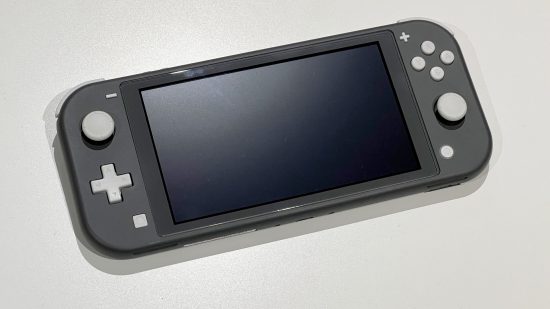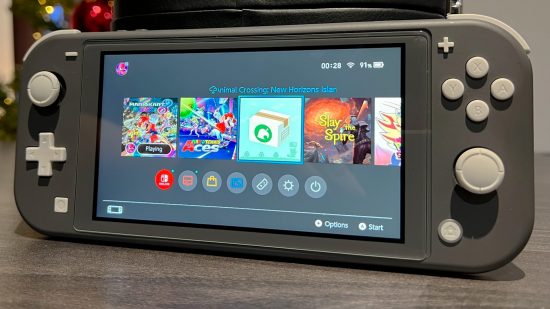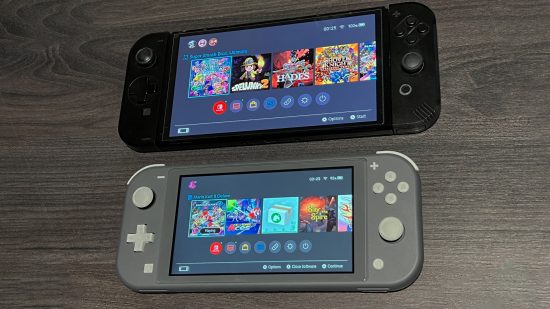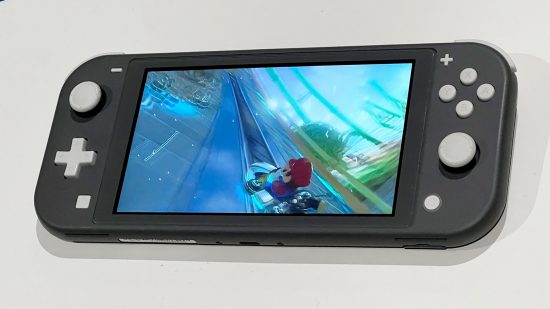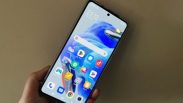Nintendo’s lineup is now three consoles strong with the Nintendo Switch, OLED, and Lite models. Despite being the cheapest option at $200 (£200), the Nintendo Switch Lite is still a fierce competitor versus its dockable siblings, depending on your use case. The Lite is undoubtedly the most comfortable Nintendo Switch console, and one of the best portable gaming consoles at an attractive price point.
We live in an age where the word ‘portable’ doesn’t necessarily mean the same thing to everyone. While I don’t have any issues fitting a handheld like the Switch OLED in my backpack, it’s not portable in the same way a gaming phone is. The Switch Lite feels like a clever compromise on the original Nintendo Switch design; the sleek and sturdy Gameboy Advance-like form factor gives the device that classic Nintendo feel.
Unlike the other Switch models – whose detachable controllers and higher price points make them feel more fragile and valuable – the Lite is more hard-wearing. I wouldn’t worry about handing this console to a child as its solid build quality means it can withstand a few knocks.
Nintendo has streamlined the Lite in every sense, even in areas I wish they hadn’t. Featuring integrated controls rather than detachable Joy-Cons, this console lives up to its ‘Lite’ name at just 275g. This makes it noticeably easier to hold for longer gaming sessions compared to its bulky counterparts, with the OLED and standard Switch weighing 420g and 398g respectively with Joy-Cons attached.
This is also the only variant that comes with a d-pad, a layout that feels familiar and far more comfortable than the split directional buttons the Switch introduced back in 2017.
Nintendo has stripped several features from this model which solidify its position as the handheld-exclusive Switch. As the Lite cannot be docked, there’s no option to connect it to a TV. This makes it significantly harder to play games that rely on the Joy-Cons, such as Nintendo Switch Sports, Super Mario Party, and Ring Fit Adventure.
There’s no kickstand to support tabletop mode either, so if you want to play these titles you need to sync a pair of Joy-Cons and find a way to prop up the Lite on a nearby surface. If you’re one of the few people interested in Nintendo Labo, you have to buy a different model to try it out as it’s incompatible with the Lite.
Another drawback of the Lite is the smaller battery which results in three to seven hours of usage compared to the Switch OLED’s four and a half to nine hours. Though the battery life is lower on the Lite, you’re not losing much time on each charge. The Lite also drops support for HD Rumble and the IR Motion Camera, two features that you may miss initially but will soon forget about.
Nintendo chose not to increase the internal storage on the Lite, capping it at 32GB like the original Switch. This won’t go very far these days, particularly if you’re building a strictly digital library of games. Thankfully, every Switch model has a microSD card slot to expand its storage, and we can help you find the best microSD card deals.
Fortunately, the Switch Lite’s compromises stop before they impact the device’s power. Every Switch game runs the same across all three models, so you don’t need to worry that your Lite is somehow making Pokémon Violet run poorly, that’s how it’s supposed to run.
Likewise, all three Switches feature 720p displays, giving the Lite’s smaller 5.5” display a marginally higher pixel density which makes games look slightly sharper in comparison. This can be awkward in text-heavy titles like Disco Elysium, but it’s not bad enough to make these types of games unplayable.
We’re used to seeing different products within the same family of devices, and Nintendo has followed suit with this trend. The cheaper Lite is available in a variety of vibrant colors which are reminiscent of older Nintendo handhelds. The Lite’s bold colors make it feel more fun while reaffirming it as a great option for kids. Comparatively, the OLED and original model sport neutral bodies that make them feel more grown-up and sensible when they’re docked next to your TV.
It’s fair to say Nintendo makes it difficult to own multiple devices without making the user jump through hoops. The Switch’s subscription-based cloud save service doesn’t back up every save, it depends on the game you’re playing. For example, if you regularly play Animal Crossing: New Horizons, your saves are trapped on your main Switch until you run a separate app called the Island Transfer Tool. You may encounter a similar problem with the Pokémon games which also contain some restrictions.
This problem doesn’t occur in every game, but considering you have to pay for a subscription just to gain access to this feature, you should expect more from a paid service. There’s also a big caveat whereby you need to have a stable internet connection on your primary console, otherwise, Nintendo can stop you from accessing your digital games. Unless your internet connection at home is perfect, you should avoid using two Switches with one account.
While it’s easy to understand why Nintendo has positioned the Lite as the entry-level option, it would only take a few upgrades to turn this into the best Switch device. The two biggest omissions on the Lite are an OLED screen and the ability to connect to a TV. Given the choice between a hypothetical upgraded Lite and a Switch OLED, I’d pick the Lite every single time.
Nintendo Switch Lite review
In its current form, the Nintendo Switch Lite is the best option for those who want an affordable handheld gaming console to use on the go. The Switch OLED is more expensive and not as portable, but its vibrant screen and versatility win out over the Switch Lite. Overall, by focusing on the handheld-only aspects, the Nintendo Switch Lite has a simple purpose and delivers on its promises.
